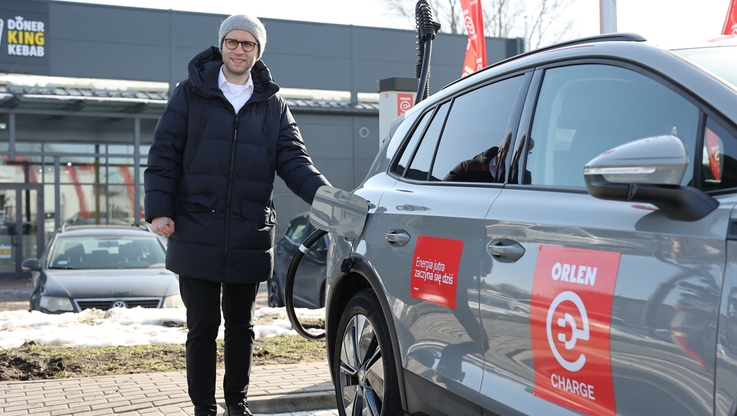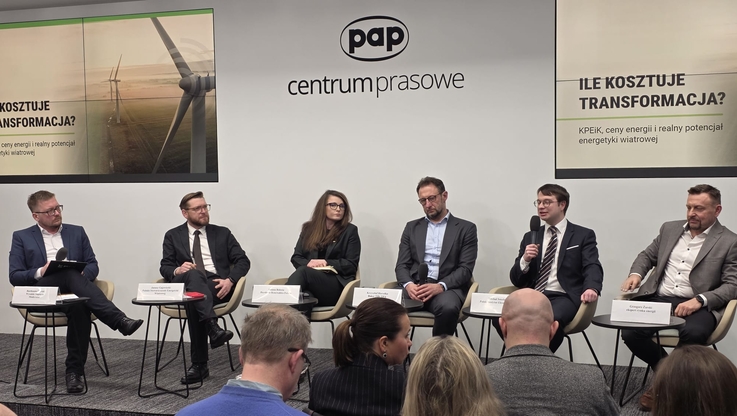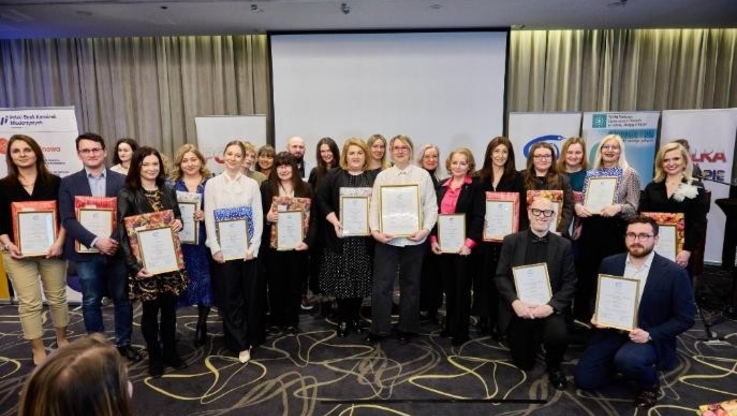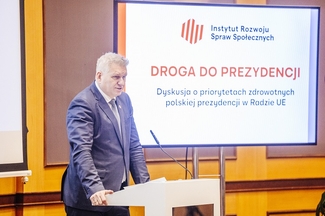Pobierz materiał i Publikuj za darmo

Each six-month-long presidency in the EU stresses a different sphere of the functioning of European societies and economies. In the second half of 2020, Germans put forward the issue of structural transformations in former coal-mining regions. The current Presidency held by Portugal which is coming to an end, was dealing with the future of rural areas.
“At ESPON, our work procedure and the tasks we focus on largely depend on the priorities of six-month EU Presidencies,” said Wiktor Szydarowski, Polish scholar and expert who has managed the programme since September 2020.
PAP MediaRoom: How have the projects developed by ESPON been translating into specific political decisions?
Wiktor Szydarowski: I can give you a recent example from the Portuguese Presidency promoting rural development. Rural regions are characterised by diverse development specificity - while some are experiencing population decline, others are thriving. Therefore they need different economic, infrastructural or social strategies. Thanks to ESPON's efforts, the concept of place-based approach has found its place in European Union documents.
This means that the individual territorial potential and specific needs of rural areas will be taken into account in the distribution of funds for their development. I believe that without the joint actions of ESPON and the Portuguese Presidency, this approach would be to a large extent sector-based, which means that the financial support would be directed on the basis of a certain general idea of how rural areas should develop in Europe. In the meantime, it is possible to accurately tailor the aid to each region thanks to the data and information we have, and thanks to the understanding of trends and development needs.
What does the work of ESPON for the development of European regions involve?
ESPON is a programme aimed at promoting and supporting European territorial and regional development by providing research results, knowledge and information to the representatives of public authorities at all levels. We build relations between policy-makers, scholars and practitioners - that is why we do not describe ESPON as a strictly research-focused programme.
Our role is to advise institutions and politicians, inform about potential opportunities or threats, and utilise research tools to make development policies more efficient. In other words, we help decision-makers assess how their communes, cities, regions or countries perform in economic, social and environmental terms, and how they compare with other areas with similar characteristics.
Is it difficult to convince politicians and decision-makers to this scientific approach to regional policy?
Representatives of central or local governments are not obliged to use specialist language. Therefore our role is to provide information, which is often complex and complicated, in an accessible form. Based on my previous work experience, both in administration and at university, I can say that an official or expert whose task is to present certain interesting ideas, does not have a whole day to do so - it is rather only a few minutes.
Are the scholars’ efforts aimed at making political decisions based on data and research results effective?
We have noticed a great demand for knowledge in the context of territorial development in all Member States, and its significance for local communities. Decision-makers wish to know how their theory ranks against the backdrop of other concepts, and whether the development path chosen for a given commune or region is optimal. What is more, they also look for role models or allies in a common cause, which is clearly reflected in the current context of energy transformation.
We have been recently dealing with a number of issues affecting every European - just transition, ageing societies, rural development, and tourism after the pandemic. Each time we presented specific solutions which later took the form of political decisions.
We have specific knowledge and practical tools which are worth promoting also in Poland. A lot of countries are currently drawing from ESPON's works. Polish institutions do that relatively rarely, but we have some time to change the situation.
What resources does ESPON propose to politicians in individual states or regions?
Only as part of the current ESPON 2020 programme, we have implemented 22 pan-European thematic projects and 29 studies concerning specific territorial areas. We have been carrying tasks commissioned by nearly 200 institutions. We can also boast a track record of over a hundred workshops, seminars and conferences. The results of the three editions of the ESPON programme, over the period of nearly 20 years, include over 1200 maps illustrating numerous social and economic processes in Europe. What is important, our whole output - documents, visualisations, tools, or recommendations - is available free-of-charge for all Internet users on the www.espon.eu website.
Nowadays it is impossible not to ask about the COVID-19 epidemic and its consequences - is it the subject of any work as part of ESPON?
Of course, the coronavirus dominated public debate in Europe for long months, and affected a number of political decisions, also at the EU level. As ESPON, we not only provided information about the territorial distribution of the spread of the COVID-19 pandemic, but also shared specific knowledge with policy-makers, which allowed the choice of an optimal strategy.
How fast and to what extent should the economy be reopened? Should restrictions be lifted, and how fast? What are the social costs of the pandemic? The replies to the questions are much easier to obtain if you have insight into the experience of other countries and regions. This knowledge is collected, processed and transmitted via ESPON.
Is Poland, as one of EU Member States, the subject of research work as part of ESPON?
We have about a dozen case studies from Poland to explore as part of ESPON projects planned for the upcoming years. We have been receiving information that some areas, regions, communes, or commune unions are interested in spin-off activities, which means that as part of a large-scale project, for example energy transformation project, we go down to the local level with our research and analyses.
The growing interest in ESPON activities means that a lot of Polish decision-makers - officials, local government authorities, third sector representatives - follow our work, and believe that its results will support the right decisions concerning the development of a given territory.
We are also collaborating with Polish academic circles, thanks to which a dozen academic and research centres take part in various projects as part of the programme. It is a good sign, because, as I have been saying for a long time now, both scholars and representatives of central and local government authorities in Poland are our partners and allies.
In June 2020, an ESPON conference was held to discuss the issue of the energy transformation of Polish coal-mining regions - featuring Polish local-government representatives and European Commission officials. What is the purpose of such meetings?
ESPON is a platform facilitating the exchange of experience, views, and dialogue. This is the purpose of the debates we are organising. As regards specifically the implementation of the European Green Deal and just transition, last year we devoted to this matter an entire issue of “TerritoriAll” - a comprehensive magazine summarising the works performed as part of ESPON, published twice a year. We noted that not only Polish regions, but also over a hundred coal-mining regions in Germany, the Czech Republic or Romania, need to face the challenges related to climate neutrality.
The ESPON programme
ESPON, a programme managed by Wiktor Szydarowski, is based on an extended network of contacts between European institutions, governments, local governments, and academic centres, thanks to which it has an actual influence on political decisions. The analyses and recommendations prepared by ESPON are taken into consideration during the distribution of billions of Euros from the EU budget, and Poland still remains a major beneficiary of the funds.
Wiktor Szydarowski is a geographer who worked at the University of Gdańsk for many years, after which he spent nearly two decades in Sweden where he advised local government administration, and conducted multiple projects related to the development of the Baltic Sea region. In September 2020 he was appointed the Director of the entity implementing the ESPON programme.
The ESPON Programme has been implemented according to a specified time frame - it is renewed every 7 years, if it is the wish of the European Commission, 27 EU Member States and four affiliated countries: Norway, Iceland, Switzerland and Liechtenstein.
Source: PAP MediaRoom
Pobierz materiał i Publikuj za darmo
bezpośredni link do materiału
POBIERZ ZDJĘCIA I MATERIAŁY GRAFICZNE
Zdjęcia i materiały graficzne do bezpłatnego wykorzystania wyłącznie z treścią niniejszej informacji
| Data publikacji | 01.07.2021, 10:04 |
| Źródło informacji | PAP MediaRoom |
| Zastrzeżenie | Za materiał opublikowany w serwisie PAP MediaRoom odpowiedzialność ponosi – z zastrzeżeniem postanowień art. 42 ust. 2 ustawy prawo prasowe – jego nadawca, wskazany każdorazowo jako „źródło informacji”. Informacje podpisane źródłem „PAP MediaRoom” są opracowywane przez dziennikarzy PAP we współpracy z firmami lub instytucjami – w ramach umów na obsługę medialną. Wszystkie materiały opublikowane w serwisie PAP MediaRoom mogą być bezpłatnie wykorzystywane przez media. |
Newsletter
Newsletter portalu PAP MediaRoom to przesyłane do odbiorców raz dziennie zestawienie informacji prasowych, komunikatów instytucji oraz artykułów dziennikarskich, które zostały opublikowane na portalu danego dnia.
ZAPISZ SIĘ




